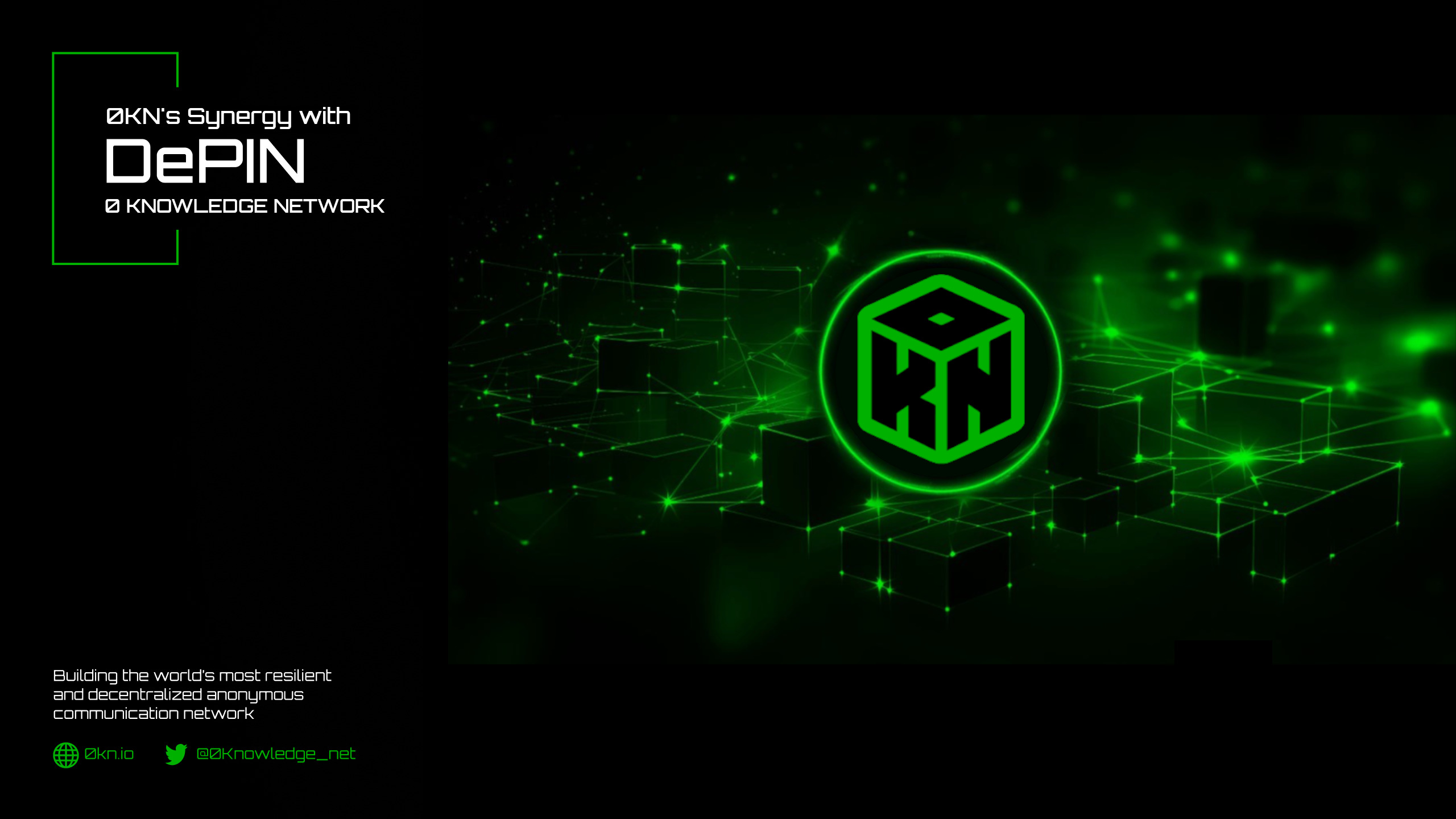ØKN's DePIN Synergy: Secured Privacy for Decentralized Physical Infrastructure Networks

Decentralized networks promise to revolutionize industries and empower individuals by opening access and eliminating single points of control. However, ensuring robust security in decentralized ecosystems is imperative. Unlike traditional centralized systems, decentralized networks distribute control and authority across nodes, offering fault tolerance and resilience against censorship but also introducing new security vulnerabilities.
Decentralized Network Security: Investigating the DePIN Approach with ØKN
This article delves into the intricate landscape of decentralized network security, exploring multifaceted challenges such as Sybil attacks and smart contract vulnerabilities. As decentralized networks proliferate, the need for a robust infrastructure becomes apparent. Enter Decentralized Physical Infrastructure Networks (DePIN): a paradigm shift advocating decentralized principles as the cornerstone for resilient, censorship-resistant infrastructure. DePIN disperses control and resources across a distributed network to mitigate single points of failure and enhance resilience against adversarial attacks.
Lets explore the potential of Ø Knowledge Network (ØKN) in enhancing decentralized network security. ØKN utilizes zero-knowledge proofs combined with mix-networks, enabling parties to transmit data and verify transactions without revealing sensitive information, thus enhancing privacy and mitigating the risk of breaches in decentralized environments. Additionally, ØKN Hardware NØDEs provide specialized network edge devices with physical tamper resistance suitable for secured deployments in untrusted environments. By synthesizing DePIN and ØKN, this research advocates for a symbiotic approach to decentralized network security, leveraging Mina Protocol as the foundational settlement layer and ØKN mix-networks as a metadata-private layer. This holistic approach ensures heightened security without compromising user privacy or the core tenets of decentralization, setting the stage for fortifying decentralized network security in the digital age.
Elevating Infrastructure: The Unique Strengths of DePINs
As a high-level overview, potential advantages of DePINs over traditional methods include:
- Rapid Scaling: DePINs can scale quickly and cost-effectively by crowdsourcing infrastructure, distributed among network participants.
- Community Ownership: Communities own the infrastructure, aligning stakeholder interests and fostering network growth.
- Open Governance: DePINs operate under open, accessible governance without centralized control, allowing for transparent and fair usage policies.
- No Gatekeeping: DePINs are permissionless and resistant to censorship, ensuring open access for all users.
- New Investment Opportunities: By introducing new investment avenues through tokenization and fractional ownership, DePINs open up revenue-generating assets to the global community.
Security Challenges in Decentralized Networks
Decentralized networks face multifaceted security challenges, including consensus attacks, smart contract vulnerabilities, and risks of data manipulation. These threats not only have implications for network integrity but can also erode user trust and threaten ecosystem sustainability
In light of these challenges, proactive measures are essential to fortify decentralized network security. This includes the development of robust consensus mechanisms resistant to Sybil attacks, the implementation of governance frameworks to prevent 51% attacks, and rigorous auditing and testing of smart contracts to identify and mitigate vulnerabilities. Furthermore, the adoption of encryption, multi-factor authentication, and other security best practices can enhance the resilience of decentralized applications and infrastructure.
Overall, a comprehensive approach to decentralized network security must encompass proactive risk mitigation strategies, continuous monitoring and evaluation, and collaborative efforts across stakeholders to address emerging threats and vulnerabilities effectively. By confronting these challenges head-on, decentralized networks can realize their full potential as secure, resilient and trustworthy platforms for innovation and interoperability.
ØKN's Enhancement for Decentralized Networks & Apps
The Ø Knowledge Network leverages the power of Layer 0 mix-networks and zero-knowledge proofs to address privacy and security concerns in decentralized environments. Mix Networks ensure metadata privacy while Zero-knowledge proofs enable parties to verify the validity of transactions or data without revealing any sensitive information, thereby preserving user privacy and confidentiality. By employing cryptographic techniques such as zk-SNARKs (Zero-Knowledge Succinct Non-Interactive Arguments of Knowledge), ØKN enables parties to engage in interactions with absolute privacy, shielding sensitive information from prying eyes while still ensuring the integrity and validity of transactions. This groundbreaking approach not only enhances security in decentralized networks but also fosters a culture of trust and transparency, empowering users to transact and communicate securely without compromising their privacy or relinquishing control over their personal data.
Synergy between DePIN and ØKN
Synthesizing the decentralized infrastructure provided by DePIN with the privacy-preserving capabilities of the Ø Knowledge Network creates a powerful synergy that addresses critical challenges in decentralized network security. With DePIN's decentralized architecture as a real-world deployment, ØKN can empower distributed applications to operate within a resilient and private environment, enhancing the overall security posture of decentralized networks and their use cases. DePIN lays the groundwork for decentralized network infrastructure for emerging use cases and economic models, while ØKN adds an additional layer of data privacy and confidentiality, ensuring that sensitive information remains shielded from unauthorized access. This symbiotic relationship not only fortifies network security against a multitude of threats but also preserves user privacy and fosters trust within the decentralized ecosystem, paving the way for a more secure and resilient digital future.
Conclusion
In conclusion, decentralized networks offer exciting opportunities for innovation and empowerment, but they also present unique security challenges that must be addressed. By embracing the principles of Decentralized Physical Infrastructure Networks and harnessing the capabilities of the Ø Knowledge Network, we can fortify decentralized network security while preserving user privacy and autonomy.
DePIN provides a resilient foundation for decentralized infrastructure, mitigating single points of failure and enhancing network integrity. In tandem, ØKN offers powerful tools for preserving privacy and confidentiality in network interactions, ensuring that sensitive information remains secure. Together, ØKN-enhanced DePINs offer a holistic approach that not only strengthens decentralized networks against emerging threats but also empowers users to engage in secure, private, and trustworthy interactions within decentralized ecosystems and applications.
Moving forward, continued research, development, and adoption of DePIN and 0KN are essential to realizing the full potential of decentralized networks in the digital age. By prioritizing security, privacy, and decentralization, we can build a more inclusive, resilient, and trustworthy decentralized ecosystem for all.
References:
- https://www.ussc.gov/sites/default/files/pdf/training/annual-national-training-seminar/2018/Emerging_Tech_Bitcoin_Crypto.pdf
- https://ethereum.org/en/whitepaper/
- https://arxiv.org/pdf/2311.00551.pdf
- https://medium.datadriveninvestor.com/basics-of-second-generation-blockchain-and-its-applications-in-capital-market-244f75ce72ff
- https://0kn.io/docs/0KN/architecture/system-overview
- https://www.peaq.network/blog/what-are-decentralized-physical-infrastructure-networks-depin
Professor Raziel K.
CWD SYSTEMS & ØKN
